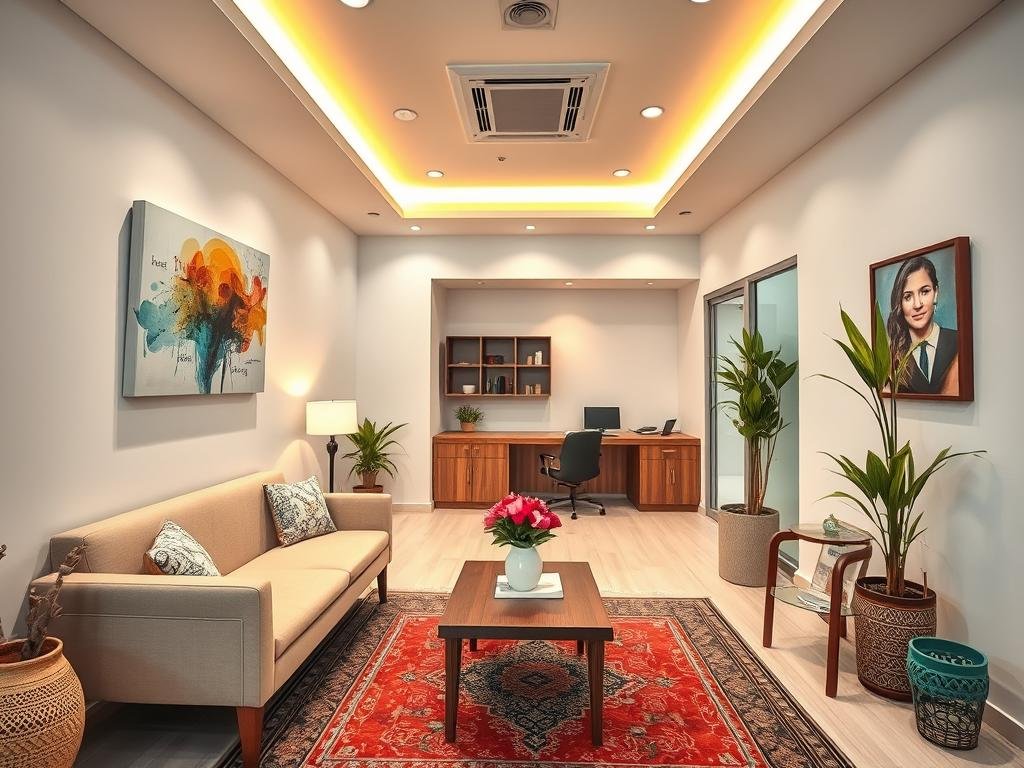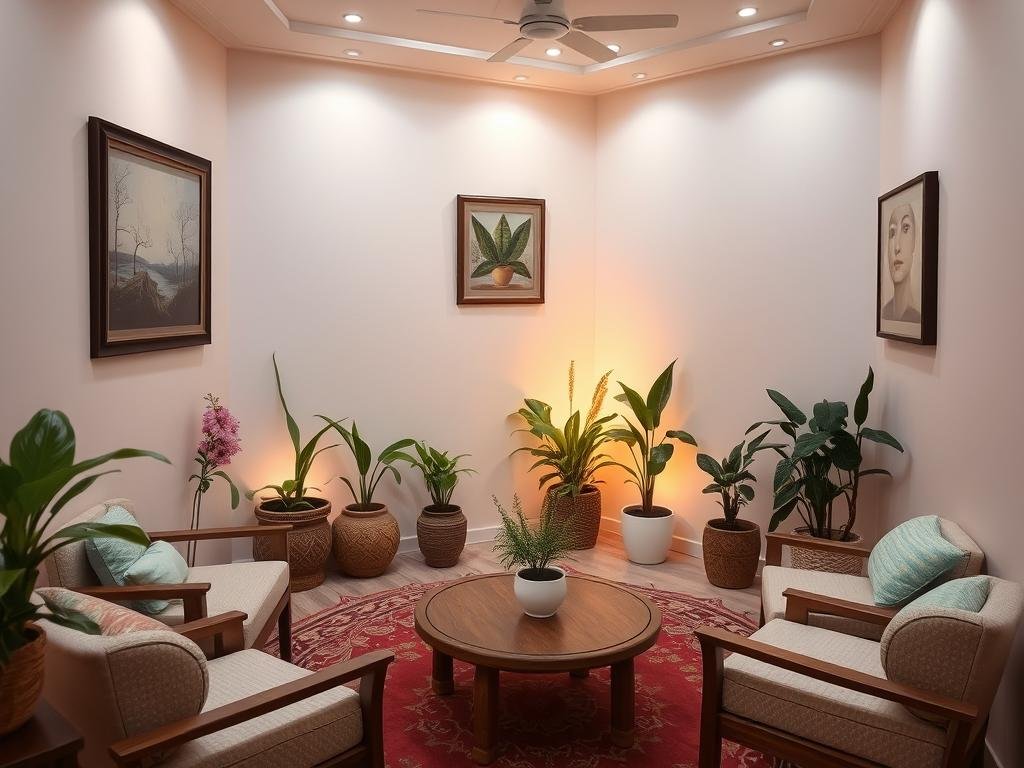In this article, we will learn about depression treatment in Pakistan. Depression can feel like a heavy weight, taking away the joy from everyday things. For many in Pakistan, it’s a silent battle, hidden by shame and wrong beliefs. But, there’s hope and healing available if we face this challenge together.

In Pakistan, mental health awareness is growing. More experts and resources are helping those with depression to take back their lives. From Karachi to Lahore, Islamabad, and more, treatments and support are getting better, meeting each person’s needs.
Key Takeaways
- Depression is a treatable mental health condition, but it requires professional assistance.
- Pakistan’s mental health landscape is improving, with more access to qualified mental health providers.
- A range of evidence-based therapies and support systems are available to depression treatement in Pakistan.
- Seeking help and breaking the stigma surrounding mental health are crucial steps towards recovery.
- Addressing depression treatment in Pakistan with compassion and understanding can lead to a fulfilling and meaningful life.
Understanding Depression Treatement in Pakistan’s Context
Depression treatement in Pakistan is complex due to cultural factors. Family and society play big roles in mental health here. Depression looks and feels different than in the West.
Cultural Factors Affecting Mental Health
In Pakistan, family and unity are key. But, this can make depression hard to face. People hide their struggles because of fear and shame.
Religion also shapes how depression is seen. This can affect how it’s treated in the community.
Common Triggers and Symptoms
Money problems, marriage issues, and school stress can lead to depression. Symptoms often show up as physical issues, not just emotional ones.
Social Stigma and Mental Health
Mental health stigma is huge in Pakistan. It stops people from getting depression therapy and psychiatric services. Those with depression face discrimination and isolation.
We need a new way of depression treatement in Pakistan. We must talk openly and make depression therapy Pakistan more accessible. This will help people get the help they need and build a stronger society.
Depression Treatment in Pakistan: Available Options
In Pakistan, people with depression can find many ways to get help. There are counseling for depression treatement in Pakistan and psychotherapy for depression Pakistan options. These are proven ways to tackle this common mental health issue.
Psychotherapy and Counseling
Psychotherapy, or talk therapy, is a key depression treatment in Pakistan. Mental health experts like psychologists and counselors lead sessions. They help people understand their thoughts and feelings about depression.
These sessions teach coping strategies and offer emotional support. They also provide practical ways to manage depression symptoms.
Medication-Based Approaches
For those with severe or ongoing depression, medication is often needed. Psychiatrists in Pakistan can prescribe antidepressants. These help balance the brain’s chemicals and ease depression symptoms.
Holistic and Alternative Therapies
Some people in Pakistan try alternative therapies for depression. This includes meditation, mindfulness, yoga, and herbal remedies. These methods can offer extra support and improve well-being.
The best treatment plan usually combines different approaches. It’s tailored to each person’s needs and preferences. Working with mental health experts helps find the right path to recovery in Pakistan.
Professional Mental Health Services in Major Cities

In Pakistan, major cities like Karachi, Lahore, and Islamabad have many mental health services. These services include top-notch psychiatric facilities and mental health centers. People in these cities can find treatments that fit their needs.
Psychiatric Facilities in Karachi
Karachi, Pakistan’s biggest city, has many famous psychiatric hospitals and clinics. The Aga Khan University Hospital has a Department of Psychiatry that offers both inpatient and outpatient care. It helps with many mental health issues, including depression.
Other notable places in Karachi include the Karachi Psychiatric Hospital and the Liaquat National Hospital. They also focus on mental health care.
Mental Health Centers in Lahore
Lahore, known as Pakistan’s cultural heart, is improving its mental health services. The Institute of Psychiatry at Baqai Medical University and the Department of Psychiatry at Allama Iqbal Medical College are key facilities. They have experienced teams ready to help with depression and other mental health issues.
Treatment Options in Islamabad
Islamabad, the capital, has many top mental health institutions. The Pakistan Institute of Medical Sciences (PIMS) has a well-known Department of Psychiatry. Shifa International Hospital and the Aga Khan Health Service in Islamabad also offer mental health services.
These places provide various treatments like individual therapy, group counseling, and medication. They aim to meet the different needs of those seeking depression treatment in Pakistan.
| City | Psychiatric Facilities | Treatment Options |
|---|---|---|
| Karachi |
|
|
| Lahore |
|
|
| Islamabad |
|
|
Types of Therapy and Counseling Services

In Pakistan, people with depression can find many therapy and counseling services. These methods help them understand their condition better. They also learn how to cope and work towards recovery.
Depression treatement in Pakistan often includes cognitive-behavioral therapy (CBT). CBT helps patients change their negative thoughts to positive ones. This approach is short and helps people take charge of their healing.
Counseling for depression in Pakistan also uses interpersonal therapy (IPT). IPT looks at how relationships and social interactions affect depression. It helps patients improve their communication and build stronger support networks.
Psychodynamic therapy is another option. It uses psychoanalysis to find the deep causes of depression. This therapy encourages self-reflection and can reveal important insights.
Both one-on-one and group therapy are available in big cities in Pakistan. Group therapy lets patients share their stories and get support from others. They also learn from each other’s experiences.
“Seeking professional help is a sign of strength, not weakness. Depression is a treatable condition, and with the right support, individuals can regain their sense of well-being and joy in life.”
Choosing the right therapy or counseling depends on the person’s needs and preferences. By exploring the different options, those with depression in Pakistan can find the best way to heal and grow.
| Therapy Type | Focus | Typical Duration |
|---|---|---|
| Cognitive-Behavioral Therapy (CBT) | Identifying and challenging negative thought patterns | 12-20 sessions |
| Interpersonal Therapy (IPT) | Improving communication and relationships | 12-16 sessions |
| Psychodynamic Therapy | Exploring deep-seated emotional and psychological issues | Long-term, open-ended |
Medication and Psychiatric Care
In Pakistan, treating depression involves medications and psychiatric care. It’s important to know about antidepressants, understand insurance, and find licensed psychiatrists. These steps help those seeking professional help.
Common Antidepressants Available
In Pakistan, psychiatrists use various antidepressants to treat depression. Some common ones include:
- Selective Serotonin Reuptake Inhibitors (SSRIs), such as fluoxetine (Prozac), sertraline (Zoloft), and paroxetine (Paxil)
- Serotonin-Norepinephrine Reuptake Inhibitors (SNRIs), such as venlafaxine (Effexor) and duloxetine (Cymbalta)
- Tricyclic Antidepressants (TCAs), such as imipramine (Tofranil) and amitriptyline (Elavil)
Remember, each antidepressant works differently for everyone. A qualified psychiatrist will help choose the best medication for you.
Medical Insurance and Treatment Costs
Costs for psychiatric care and medications can be a worry in Pakistan. Some insurance plans help cover these costs, but coverage varies. It’s key to know your insurance well to get the mental health care you need.
Finding Licensed Psychiatrists
Getting quality psychiatric care is vital for treating depression in Pakistan. You can find psychiatrists by contacting hospitals, clinics, or mental health groups. Online directories and referrals from doctors can also help find the right mental health professionals.
By learning about antidepressants, understanding insurance, and finding psychiatrists, you can address your mental health needs in Pakistan. This helps you on the path to recovery.
Holistic and Alternative Treatment Approaches
In Pakistan, there’s a growing interest in holistic and alternative treatments for mental health care. These methods offer more than just medicine. They provide a full path to wellness and recovery.
Mindfulness techniques are becoming more popular in treating depression. Activities like meditation, yoga, and deep breathing help reduce stress and improve mood. They teach people to handle negative thoughts and emotions better.
Herbal remedies and Ayurvedic medicine are also being explored. These traditional practices are part of Pakistan’s culture. They can be used alongside modern treatments to help people heal.
Changing your lifestyle can also help with depression. Regular exercise, a healthy diet, and enough sleep are important. These changes focus on both physical and emotional health.
The best approach in Pakistan is to mix these alternative methods with traditional treatments. This way, mental health professionals can help people take charge of their healing. It leads to better results and a higher quality of life.
Support Groups and Community Resources
In Pakistan, people with depression can find help through community programs. These programs offer a safe place for those seeking support. They help during the mental health journey.
Online Support Communities
The internet is a great way to connect with others in Pakistan. Online communities provide a sense of belonging. People can share their experiences and get advice from others who understand depression.
- Online forums, like the Depression Support Pakistan group, let people share their stories. They find comfort in knowing they’re not alone.
- Social media platforms, like Facebook and WhatsApp, have private groups. Here, people can talk, get support, and find mental health resources.
Family Support Programs
Family support is key in recovery. In Pakistan, many organizations help both those with depression and their families.
- The Mental Health Foundation of Pakistan offers family counseling. Family members learn about depression and how to support their loved ones.
- Local NGOs, like the Karachi-based Aga Khan Development Network, have family support groups. They provide a safe space for families to share and learn.
NGOs and Mental Health Organizations
Recently, many NGOs and mental health organizations have started in Pakistan. They work to improve depression treatment and support.
| Organization | Focus Area | Services Offered |
|---|---|---|
| Mental Health First Aid Pakistan | Mental health awareness and education | Training programs, community outreach, and referral services |
| Pakistan Association for Mental Health | Advocacy and policy-making | Lobbying for improved mental health policies, research, and resources |
| Rozan | Counseling and psychosocial support | Individual and group therapy, crisis intervention, and support groups |
These organizations help fight depression stigma. They advocate for better policies and connect people with needed resources.
Breaking Barriers: Accessing Mental Health Care
Finding mental health care in Pakistan can be tough. But, with the right steps, people can get the help they need. A big problem is the social stigma around mental health. This makes many people shy away from seeking help.
We need to work together to change this. By spreading awareness and understanding, we can help reduce stigma. This will encourage more people to seek depression treatment in Pakistan and mental health care Pakistan.
Money is also a big issue. Many can’t afford the cost of mental health services. But, efforts are being made to make care more affordable. This includes more community programs and mental health coverage in health insurance.
- Leveraging public-private partnerships to establish subsidized mental health clinics in underserved areas.
- Advocating for increased government funding and resources dedicated to mental health care Pakistan.
- Encouraging employers to prioritize and provide mental health benefits for their employees.
Not knowing about mental health services is another problem. Educational campaigns and improving mental health knowledge can help. This way, more people can find the support they need. Whether it’s online, through family programs, or with local NGOs and mental health organizations.
| Barrier | Strategy |
|---|---|
| Social Stigma | Mental health awareness campaigns, reducing stigma within communities |
| Financial Constraints | Affordable community-based mental health programs, insurance coverage |
| Lack of Awareness | Educational initiatives, strengthening mental health literacy |
By tackling these barriers, we can help more people get the depression treatment in Pakistan and mental health care Pakistan they need. This will greatly improve the mental health of our nation.
Conclusion
In this guide, we explored depression treatment in Pakistan. We looked at cultural factors, common triggers, and the social stigma around mental health. We also discussed various treatment options, from professional services to holistic approaches.
It’s important for people in Pakistan to focus on their mental health. They should seek help when needed. We must work together to break the stigma around mental health.
By doing so, we can create a space where talking about mental health is encouraged. This way, those dealing with depression can find their way to recovery. They can regain their well-being.
Remember, you’re not alone. There are mental health professionals, supportive communities, and lots of resources to help you. Reach out, seek help, and start your journey to a healthier life.
FAQ
What are the main depression treatment options available in Pakistan?
In Pakistan, treatments for depression include therapy, counseling, and medication. There are also holistic and alternative methods. Experts like psychiatrists, psychologists, and therapists use different therapies to help.
How can I find licensed mental health professionals in Pakistan?
To find licensed mental health professionals in Pakistan, look for reputable facilities and centers. Major cities like Karachi, Lahore, and Islamabad have many options. Hospitals and clinics also offer specialized services.
What are the common antidepressants available in Pakistan?
Common antidepressants in Pakistan include SSRIs and SNRIs. Examples are fluoxetine, sertraline, and venlafaxine. Always talk to a psychiatrist to find the right medication for you.
Are there any support groups or community resources for people dealing with depression in Pakistan?
Yes, there are many support groups and resources for depression in Pakistan. You can find online communities, family programs, and NGOs focused on mental health.
How can I overcome the social stigma surrounding mental health in Pakistan?
Overcoming stigma in Pakistan is tough but important. You can raise awareness, start open conversations, and push for better policies. This helps more people seek help.
What are some holistic and alternative treatment approaches for depression in Pakistan?
Besides traditional treatments, holistic methods are also available. These include traditional healing, mindfulness, and lifestyle changes. They can be used alongside conventional treatments for better care.


